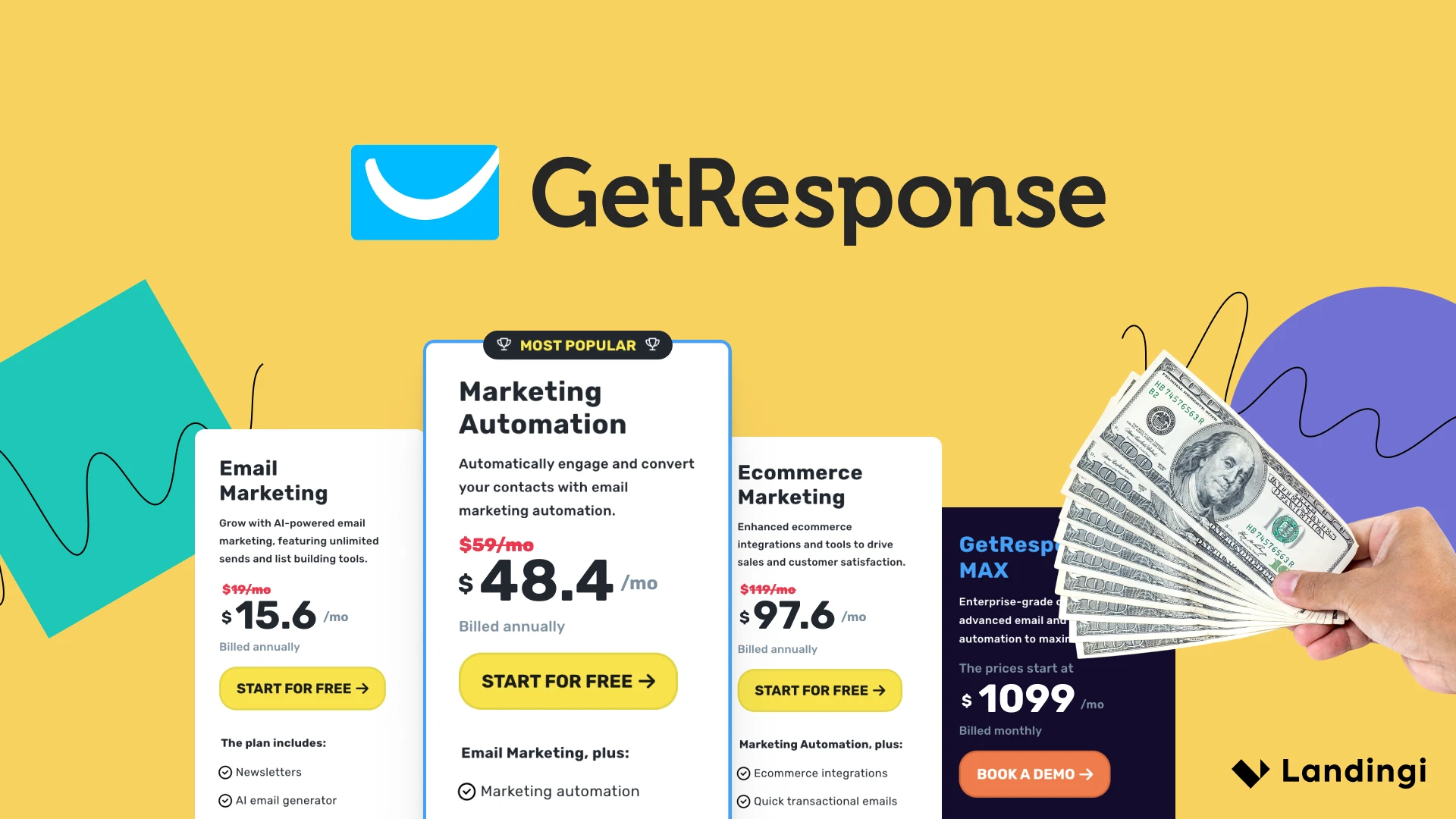If you’re looking for the best GetResponse alternatives, you’re probably on the hunt for a better-suited email marketing platform, or you feel the platform’s numerous additional features fall short of your expectations. In this article, we compare GetResponse with leading competitors, both in email marketing and in terms of their added functionality.
Next to MailerLite or Brevo, one of its most serious competitors, especially in the field of landing pages, funnels, forms, marketing automation, and optimization, is Landingi. Our comparison is based on our tests as well as on the analysis of user feedback on both tools collected via three top marketplaces: G2, GetApp, and Capterra. See how these tools go beyond GetResponse and make the smart choice for your marketing strategy.
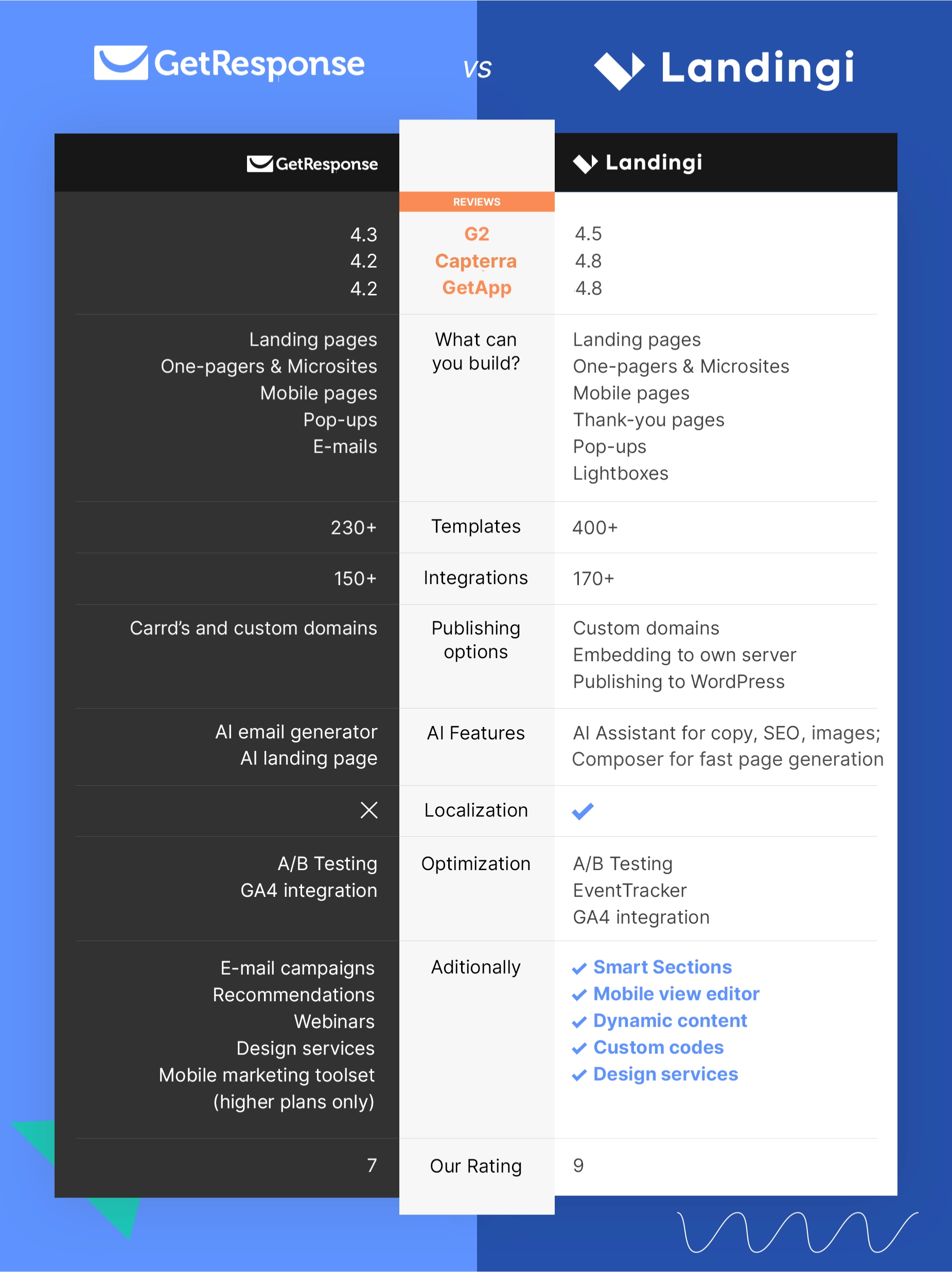
Why Should I Consider GetResponse Alternatives?
You should consider GetResponse alternatives if you want different pricing, features, or integrations that better fit your business. GetResponse has been a consistent name in the email marketing landscape, serving over 350,000 customers worldwide and supporting over 20 languages, making it a truly global tool.
What sets GetResponse apart is its robust marketing automation capabilities. Users can create complex, scalable workflows based on the specific actions and behaviors of their subscribers. This level of customization and control makes GetResponse a powerful tool in the hands of savvy marketers.

With email marketing at its core, their toolkit also includes a landing page creator and a range of marketing automation solutions. However, other tools may offer stronger deliverability, easier usability, or more advanced CRM functions.
Choosing an alternative makes sense if your company requires specific features such as advanced e-commerce automation, higher email volume at a lower cost, or a landing page builder that offers more than GetResponse’s. For example, MailerLite focuses on intuitive design and ease of use, Brevo emphasizes multichannel communication and transactional email capabilities, and Landingi specializes in high-converting landing pages and streamlined lead generation.
Think beyond GetResponse. Landingi gives you more where it counts.
What are the best GetResponse Alternatives?
The best GetResponse alternatives are MailerLite, Landingi, Brevo, Mailchimp, and ActiveCampaign. These platforms offer more focused tools for email marketing, automation, or conversion optimization. While GetResponse combines several functions in one platform, the mentioned tools provide more specialized solutions in key areas such as landing page design, omnichannel messaging, and sales automation.
| Alternative | Stand Out Feature | Cost (Starting at) | Free Plan |
|---|---|---|---|
| MailerLite | Drag-and-drop email builder with automation | $9/month (500 contacts) | Yes (up to 500 subscribers, 12K emails) |
| Landingi | Landing page creation, lead generation | $24/month | Yes (limited trial) |
| Brevo | Multichannel marketing (email, SMS, WhatsApp) | $8/month (2,000 contacts) | Yes (up to 300 emails/day) |
| Mailchimp | Advanced templates with AI content tools | $13/month (500 contacts) | Yes (up to 500 contacts) |
| ActiveCampaign | CRM-integrated email automation | $15/month (1,000 contacts) | Free Trial |
5 Top GetResponse Alternatives in 2025
GetResponse remains a popular email marketing platform, known for its features, templates, and automation tools. However, some users may prefer alternatives that better match their business needs or offer simpler, more focused toolsets.
Here are five strong alternatives to GetResponse, each with a distinct advantage:
- MailerLite, best for small teams
- Landingi, best for creating and optimizing landing pages
- Brevo, best for multichannel communication
- Mailchimp, best for versatile email marketing and audience growth
- ActiveCampaign, best for advanced automation
1. MailerLite – Smart Email Marketing for Small Teams
MailerLite has carved out a niche as the ideal email marketing tool for beginners and small teams who value ease without losing impact. Its clean interface makes campaign creation a breeze – thanks to a drag-and-drop editor, prebuilt templates, and automation workflows. The platform covers the full toolkit: you can build emails, test A/B variations, and track performance in real time. Open rates, link clicks, and subscriber growth are all visible at a glance through well-designed dashboards.
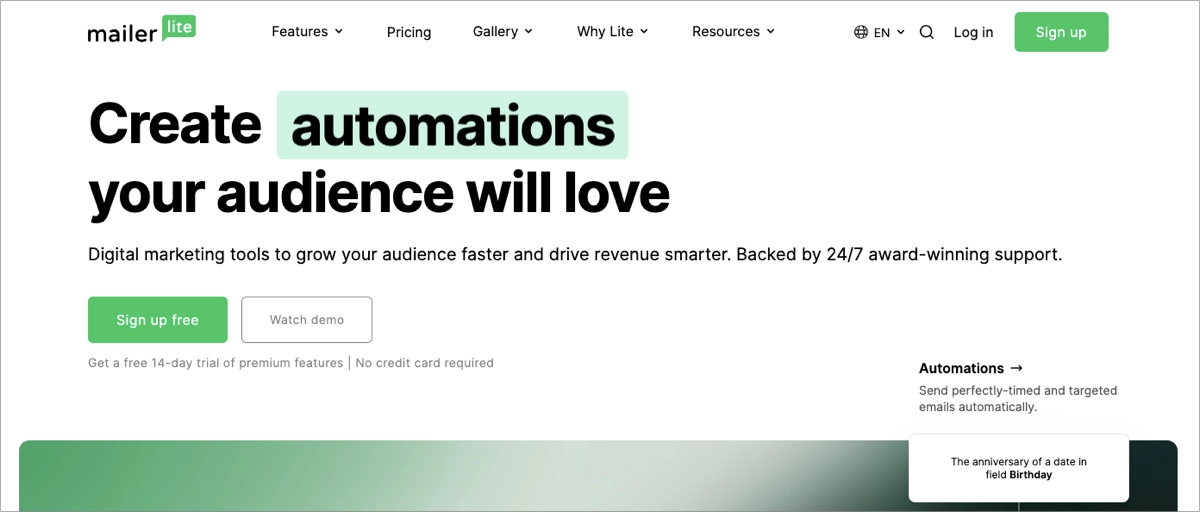
Automation is where MailerLite shines. You can set up personalized journeys triggered by actions like signups or clicks, making it perfect for onboarding, nurturing leads, or sending smart follow-ups without manual work. This platform also offers additional features, like a website builder, landing page builder, or form builder; however, these are just side tools with basic options.
User Rating
- G2: 4.6/5
- GetApp: 4.7/5
- Capterra: 4.7/5
Users consistently highlight the editor’s simplicity and the helpful templates that remove design barriers. Reviews on popular platforms echo that it’s friendly, fast, and reliable, especially for those new to email marketing. And in my opinion, that’s what really sets MailerLite apart – it lowers the learning curve without watering down what you can actually do.
That said, not everything is seamless. Some long-time users miss features from the older MailerLite Classic (like multi-client dashboards), and others mention that setting up automations can take a bit of practice. But for most small teams, the trade-off is worth it: modern UX, strong deliverability, and enough power to grow.
Pricing
Starting at $9/month for 500 subscribers (more subscribes = higher costs), MailerLite also offers one of the most generous free plans on the market, covering up to 12,000 monthly emails. Higher tiers unlock advanced automations and faster support.
MailerLite vs. GetResponse: Which One’s for You?
Here’s a quick look at how the key features and pricing plans stack up:
| Feature | MailerLite | GetResponse |
|---|---|---|
| Drag-and-drop simplicity | Smooth and beginner-friendly | Less intuitive |
| Landing page builder | Included even in free plan | Included, but with restrictions |
| Agency support (multi-client) | Limited in new version | Stronger (dedicated solutions) |
| Free Plan | Yes, up to 12K monthly emails | 30-day Free Trial |
| Pricing | Starts at $9/mo (up to 500 contacts) | Starts at $15/mo (up to 1000 contacts) |
MailerLite is best for solo creators, small businesses, and teams that need a clean, intuitive platform with all the essentials. GetResponse, on the other hand, is better suited for agencies or advanced marketers running complex campaigns at scale.
2. Landingi – Excellent Solution for High-Impact Landing Pages
If landing pages are your top priority, Landingi makes a compelling case. Originally built as a pure landing page tool, it has evolved into a flexible digital marketing platform – offering A/B testing, AI-assisted content and page layout generation, pop-ups, analytics, and even basic e-commerce features.

Its intuitive drag-and-drop editor and deep template library make it easy to launch polished campaigns without touching a line of code. But Landingi doesn’t stop at simplicity. For larger teams or enterprises, it adds advanced features like SSO, audit logs, domain whitelisting, custom workspaces, and dedicated account managers – giving it serious B2B muscle.
Grow without limits – Landingi ensures your marketing scales smoothly with enterprise-grade solutions.
Where it really stands apart from GetResponse is in page-building power. Smart Sections let you manage bulk edits with just a few clicks – changes apply to each page that includes the selected section. You get more creative control through parallax effects and sliders. And the mobile editor gives you full independence to fine-tune mobile views – something GetResponse lacks.
User Rating
- G2: 4.5/5
- GetApp: 4.8/5
- Capterra: 4.8/5
Users say it strikes a rare balance: simple enough for quick launches, flexible enough for advanced builds. Some note a learning curve and the occasional need for light custom code, but overall, it’s praised for speed, control, and value. And I think that’s exactly what makes Landingi stand out – it grows with you, instead of boxing you in.
Pricing
Landingi’s pricing scales with your needs. There’s a free plan for those just starting their landing page journey – perfect for testing the waters. Paid plans start at $24/month (billed annually) for basic usage. Professional plan for $57/month (billed annually) unlocks more features, and for large teams or enterprises, the $1,150/month (billed annually) plan includes advanced features like 100 custom domains, unlimited users, enhanced security, and dedicated support – a serious package for high-volume operations.
Landingi vs. GetResponse: Which One’s for You?
Compare the standout features and pricing tiers at a glance below:
| Feature | Landingi | GetResponse |
|---|---|---|
| Smart Sections (reusable) | Yes | No |
| Advanced design options | Sliders, parallax, pop-ups, lightboxes | Limited customization |
| Mobile editor | Independent mobile adjustments | Auto-optimized only |
| Enterprise support | SSO, audit logs, dedicated manager | Limited enterprise features |
| Pricing | 14-day Free Trial; Free plan; Paid plans from $24/mo (billed annually) | 30-day Free Trial; No Free Plan; Paid plans from $15/mo (billed annually) |
Landingi is the better pick if landing pages are central to your strategy – especially for agencies, SaaS teams, or marketers who want fast, custom pages without developer support. It also integrates well with tools like HubSpot, Salesforce, Zapier, and Google Analytics, making it a smart fit for teams already plugged into a broader stack.
3. Brevo – Multichannel Marketing Made Simple
Formerly known as Sendinblue, Brevo is a smart choice for businesses that want to manage email, SMS, WhatsApp, and live chat – all under one roof. It blends communication and email marketing tools with CRM features and visual workflow builders, making it easy to automate messages, follow up with leads, and stay organized without juggling multiple platforms.
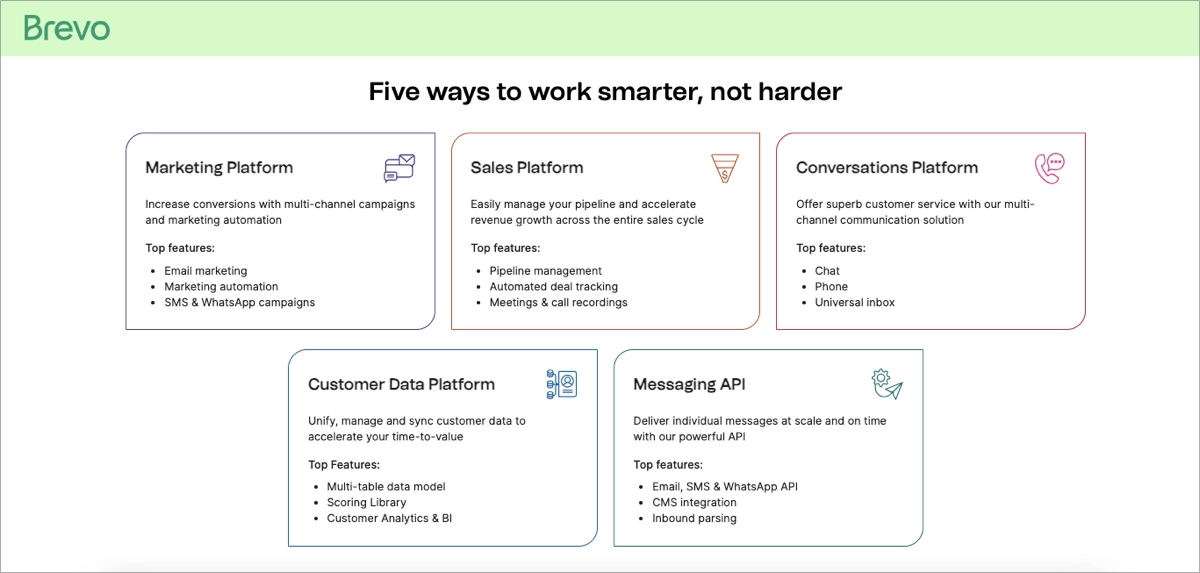
Brevo’s visual automation builder makes it easy to map out campaigns triggered by real user behavior – like email opens, link clicks, or visits to your site. Whether you’re onboarding new customers, re-engaging inactive ones, or sending transactional updates, the workflows feel intuitive and flexible. One standout feature? You get unlimited contacts, even on the free plan. Since pricing scales with email volume (not list size), it’s a smart pick for businesses with big audiences but modest sending needs.
User Rating
- G2: 4.5/5
- GetApp: 4.6/5
- Capterra: 4.6/5
With ratings of 4.5+, Brevo earns consistent praise for being beginner-friendly, fast to set up, and efficient for running personalized email campaigns. Users often highlight how quickly they can go from idea to execution, without getting stuck in complicated tools.
It’s not without its flaws – support can be slow, tutorials are a bit thin, and the email editor isn’t as flexible when importing custom templates. But where it shines is multichannel marketing on a budget. And in my opinion, that’s what makes Brevo so appealing: it gives small teams the kind of reach and automation you’d expect from a far pricier platform, without the usual complexity.
Pricing
Pricing is another reason Brevo stands out. The free plan lets you send up to 300 emails daily – a solid option for small campaigns or testing the platform. Paid plans start at just $8/month and include marketing automation for up to 2,000 contacts. Need more scale? The $16/month plan unlocks unlimited contacts while keeping automation features intact – making it both powerful and budget-friendly.
Brevo vs. GetResponse: Which One’s for You?
Let’s break down the core features and pricing plans for a clearer picture:
| Feature | Brevo | GetResponse |
|---|---|---|
| Multichannel campaigns | Email, SMS, WhatsApp, chat | Email + basic SMS (paid add-ons) |
| Built-in CRM | Yes | Integrations |
| Workflow automation | Visual, beginner-friendly | Advanced but more complex |
| Template design flexibility | More limited, harder to import templates | More design control |
| Pricing | Free Plan with 300 emails/day; Paid Plans from $8/mo (up to 2K contacts) | Free Trial; Starts at $15/mo (up to 1000 contacts) |
Brevo is the better pick if you need multichannel marketing – especially WhatsApp or SMS marketing – and want built-in CRM tools without paying enterprise-level prices. It’s an ideal marketing automation tool for growing businesses with large contact lists and simple send needs, while GetResponse may be stronger for email-only campaigns that require deeper segmentation or webinar tools.
4. MailChimp – A Familiar Name with Powerful Tools
Mailchimp is one of the most recognized GetResponse alternatives – and for good reason. It’s a powerful email marketing tool that blends automation, customer insights, and multichannel features into a cohesive platform. Its email templates make it easy to design professional campaigns without starting from scratch. On top of that, Mailchimp includes social media marketing tools, allowing teams to schedule posts, generate leads, and engage followers beyond the inbox.
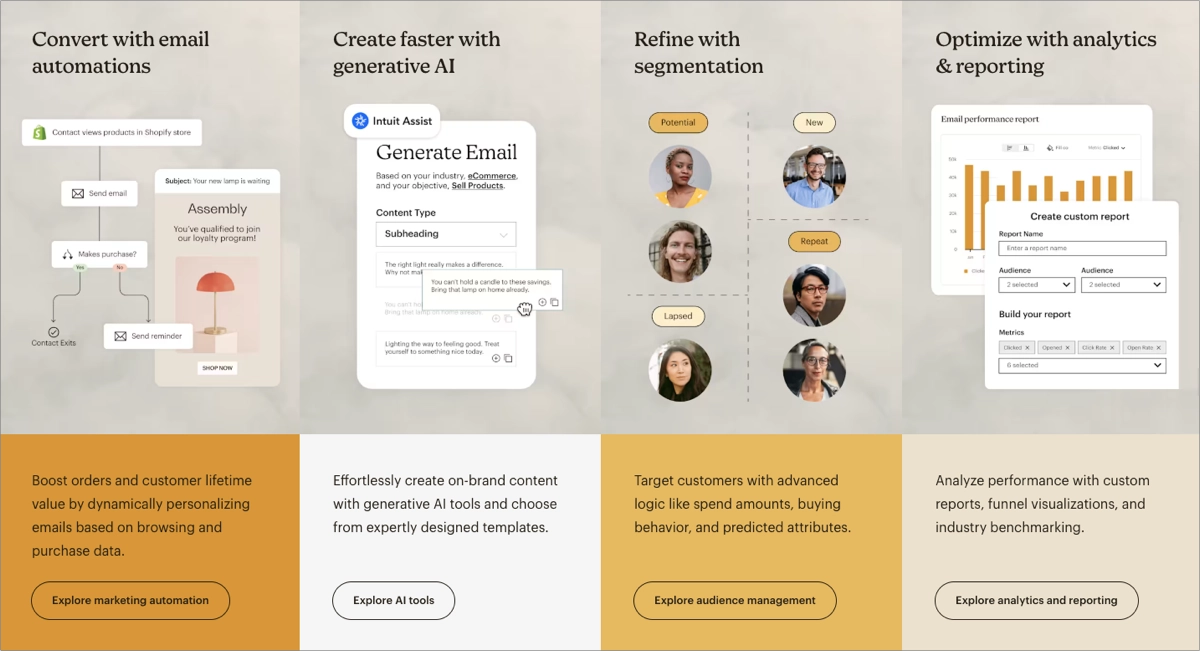
What stands out is its flexibility: you can launch automated campaigns, build lead funnels with ease, and use CRM features to make the most of your customer data. The platform also supports basic ad tools and integrates smoothly with e-commerce and content platforms, making it more than just a newsletter builder.
User Rating
- G2: 4.5/5
- GetApp: 4.6/5
- Capterra: 4.6/5
According to GetApp, 93% of users are satisfied with its email features – a strong signal that it’s still a go-to for reliable automated emails and campaign management. But it’s not without downsides. A notable 79% of users on GetApp report issues with spam filtering, which can impact deliverability. And compared to Constant Contact or MailerLite, Mailchimp’s pricing climbs quickly as your list grows. From my perspective, that’s the trade-off: you get polish, advanced tools that let you grow your business – but you’ll need to weigh those perks against long-term cost, especially if you’re scaling fast.
Pricing
Pricing starts at $13/month for up to 500 contacts, but costs ramp up quickly with audience size – something to watch if you’re scaling fast. That said, for small to mid-sized teams focused on automation, brand consistency, and multichannel reach, Mailchimp still holds its ground as a top-tier solution.
Mailchimp vs. GetResponse: Which One’s for You?
Check out a quick comparison of key features and pricing plans:
| Feature | Mailchimp | GetResponse |
|---|---|---|
| Email automation | Yes, with multiple workflows | Yes, advanced but more complex |
| Audience management | Strong, with up to 5 audiences (Premium) | Available |
| AI marketing tools | AI-generated automations, emails and copy, and recommendations | Available (limited on lower plans) |
| Social media tools | Campaign planning + lead generation | Not native, requires integrations |
| Pricing | Free Plan up to 1,000 emails/month or 500/day; Paid plans from $13/month (500 contacts) | Free Trial; Starts at $15/mo (up to 1000 contacts) |
Choose Mailchimp if you want a well-rounded platform with cross-channel tools, automation, and strong analytics. It’s ideal for growing brands that need smart features and don’t mind paying a bit more for polish. GetResponse, by contrast, may suit users who need deep segmentation, or more generous pricing tiers for large lists.
5. ActiveCampaign – Deep Automation Meets Smart CRM
If your team is ready to go beyond basic email marketing, ActiveCampaign offers a serious upgrade. It blends powerful automation tools with a built-in CRM, giving you the ability to manage leads, track customer behavior, and run targeted campaigns – all in one platform.
Its visual automation builder is one of its key features, making it easy to design multi-step journeys without writing a line of code. You can segment contacts, personalize messaging, and build landing pages with ease. Even small teams can pull off advanced email marketing campaigns, thanks to the platform’s smart workflows and AI content tools.
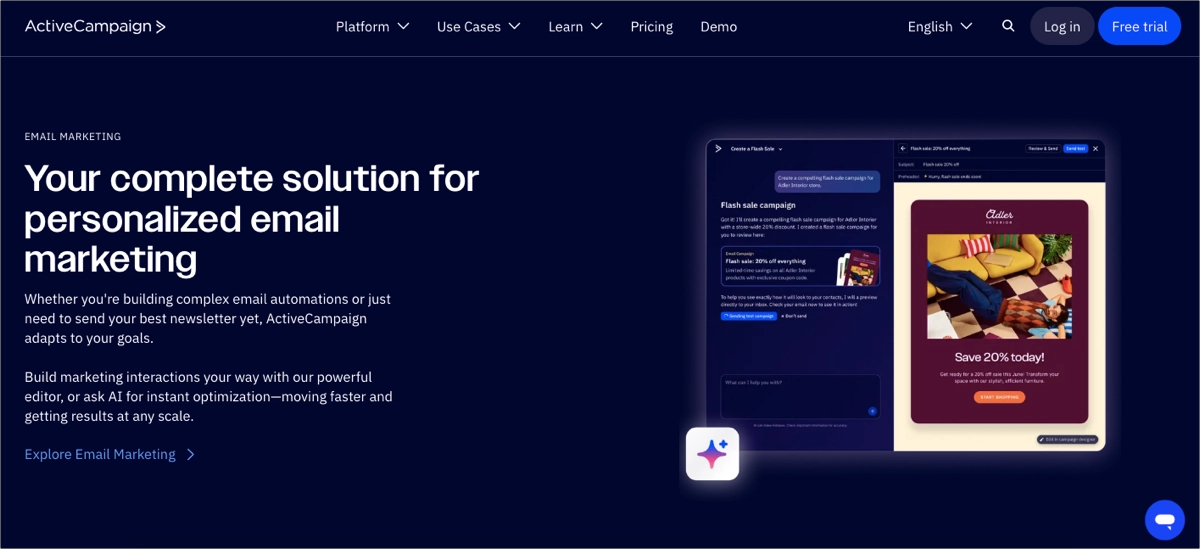
User Rating
- G2: 4.5/5
- GetApp: 4.6/5
- Capterra: 4.6/5
Users often highlight how much they can achieve without needing a developer, especially given the platform’s user-friendly interface. However, the experience isn’t flawless. Some users report occasional bugs or slow load times that can disrupt workflow.
What sets ActiveCampaign apart, in my opinion, is how naturally it brings marketing and sales together. You’re not jumping between tools or mailing lists – everything flows through one system, which helps teams move faster and stay aligned.
Pricing
ActiveCampaign’s pricing is something to consider. The Starter Plan begins at $15/month for 1,000 contacts, while the Pro Plan – which unlocks advanced automation, conversion tracking, and premium CRM integrations jumps to $79/month for the same list size. It’s not the cheapest option, but for businesses looking to unify marketing and sales with serious automation, the value is there.
ActiveCampaign vs. GetResponse: Which One’s for You?
See how the key features and pricing options line up across platforms:
| Feature | ActiveCampaign | GetResponse |
|---|---|---|
| Visual automation builder | Yes, intuitive and powerful | Yes, less intuitive |
| Integrated CRM | Built-in for sales + customer tracking | Requires external CRM integrations |
| Multi-channel marketing | Email, SMS, WhatsApp | Email + basic SMS (add-ons) |
| AI-powered tools | For content and automation | Available (limited on lower plans) |
| Pricing | From $15/month (1,000 contacts), Pro $79/month | Free Trial; Starts at $15/mo (up to 1000 contacts) |
ActiveCampaign is ideal for teams that want to go deeper, combining CRM, automations, and multichannel messaging in one place. While GetResponse is strong in email and webinar tools, ActiveCampaign wins when growth depends on seamless coordination between marketing and sales.
Choose the Best GetResponse Alternative
Finding the right GetResponse alternative isn’t about picking the “best” platform overall – it’s about finding the one that fits your team, goals, and growth stage.
- MailerLite offers simplicity and great value for beginners.
- Landingi excels at landing page creation with enterprise-ready features.
- Brevo is ideal for multichannel marketing with built-in CRM tools.
- Mailchimp suits teams that want a polished design and cross-channel automation.
- ActiveCampaign delivers powerful automation and CRM for advanced users.
Each of these tools brings something unique to the table. If you’re just getting started, choose MailerLite, and if you seek deep automation and full control over customer journeys, ActiveCampaign will give you the structure and flexibility to scale with confidence. If landing pages are central to your strategy, Landingi is especially worth exploring. Its mix of design flexibility, no-code tools, and enterprise capabilities makes it a strong choice for marketers who want results without complexity. Give it a try and see how easily your campaigns can scale.



